My weekend at Slash Hackathon 2019
Starting Friday, March 29th to Sunday, March 31st, I attended my first ever Hackathon in Berlin. After receiving an invitation mail from our so called faculty 3 (computer science) talking about hacking and the event taking place in Berlin, I could not resist, sent in my application and got to spend an amazing weekend at Slash.
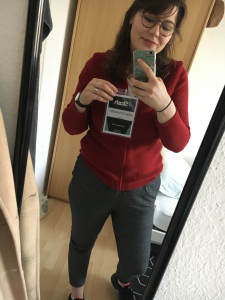
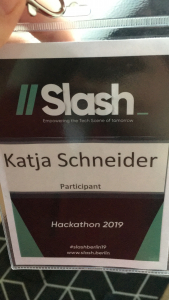
It’s Sunday evening (March 31st, 2019) and I think I’m speaking behalf of the other 99 participants as well as the organizers of Slash when I say that I am tired and exhausted, but had a great and eventful weekend.
But first, let’s take a step back almost exactly 57 hours before. On Friday, March 29th at around 10am, I was on my way to Factory Görlitzer Park, where the Slash hackathon will have taken place this weekend, to visit a Berlin startup. After first conversations with organizers of the event and first confusing questions like „reden wir jetzt auf Deutsch oder auf Englisch!?“, I gained a first insight into the Factory (which I later found out is a building, more so a „startup-campus“ rented by companies as well as CODE University of Applied Sciences, the university whose students founded Slash, an initiative for Hackathons).
My first impression of Factory was very „tech-y“, there were many open work spaces and people sitting around on the floor on their laptops. (So just like you would probably imagine a (tech) start-up.
The people who organized and / or helped out at the event were very welcoming and friendly, thus the first conversations about CODE University and studies at CODE developed while one of them guided my way to the restroom.
After we waited around for a little bit, it was time for us to leave to visit Grover, a tech-renting startup in Kreuzberg. We actually got the chance to get an office tour as well as a presentation of the company and what it does by Patrick, a sales developer at Grover.
Typical for a startup, it’s interieur was very colorful. The office itself was open and light-filled with modern palette furniture as well as big beanbags.
The workshops were held by the mentors, coming from different companies. I, also, took the time to visit a workshp on „Jump start your project with a react system“, held by Daw-Chih Liou, who is a senior software engineer at Trivago.
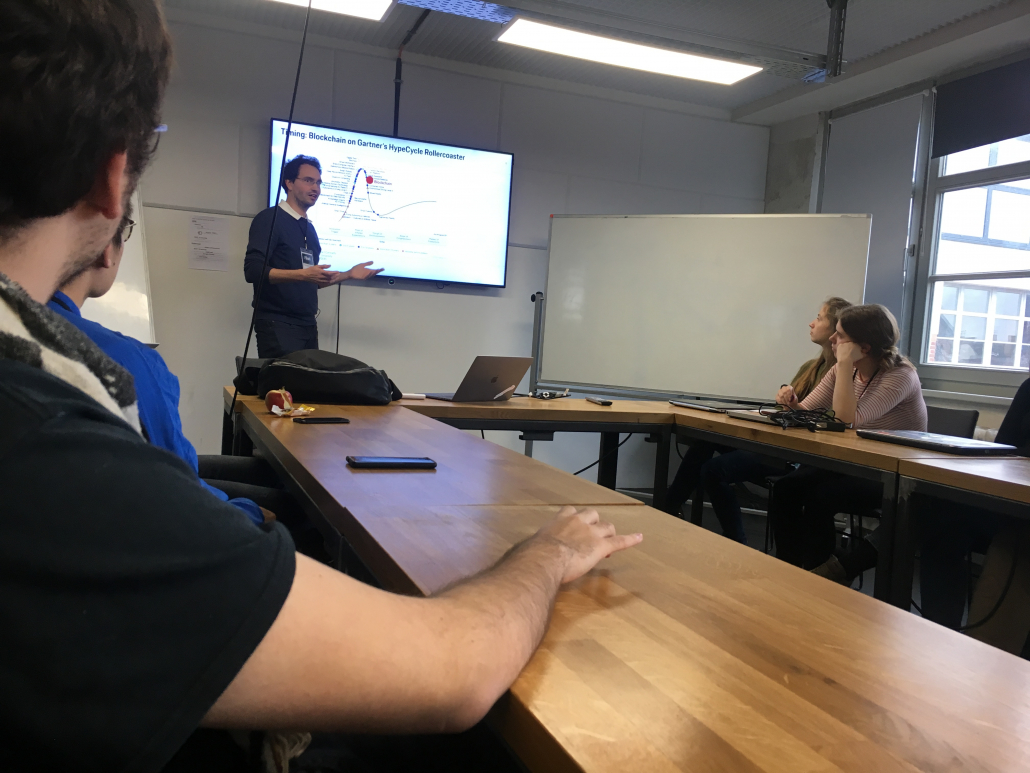
workshop held by Claudio Weck (Porsche) on blockchain
We ended the first evening with dinner and some drinks. Before that, I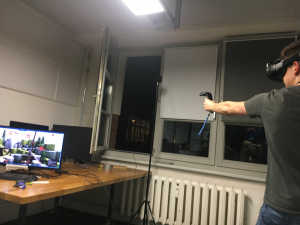 got to try out playing a game using VR glasses for the first time and actually used the opportunity to talk to many students from all over Europe.
got to try out playing a game using VR glasses for the first time and actually used the opportunity to talk to many students from all over Europe.
Thanks to discounts offered by Uber, one of the sponsors, I got my ride home to the AirBnB room I booked for only about 2€ and got some hours of sleep which were actually much needed for the upcoming „big days“ and the start of the actual Hackathon.
On Saturday, people got the chance to pitch their ideas for the Hackathon to all other participants in order to form groups. Since this was my first Hackathon ever, my plan was to join a group / someone who already had an idea in mind. After hearing all different kinds of ideas, I talked to some of the people who presented, introduced myself and asked if I could join their team.
I eventually found a group of four, including Heike, a founder living in Berlin, who pitched „watermelon intelligence“, an idea about personal data sciene dashboards, as well as Jan and Alina who are actually both from Bremen as well, studying computer sciene at Uni Bremen.
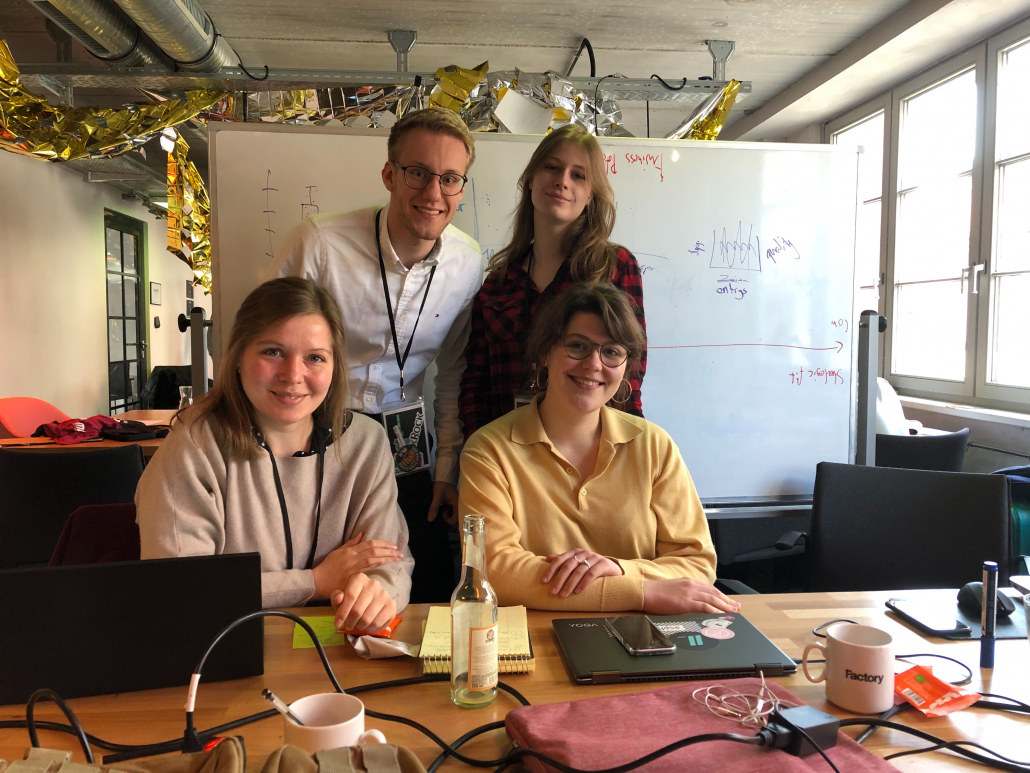
our team „watermelon intelligence“; Jan-Hendrik, Alina, Heike and I.
After forming the groups the actual „hacking phase“ began, which, for us, meant searching data sets on the internet for our project to analyze in order to find correlations between them. The idea was basically to find, for example, sleep data and analyze it in order to find out more about why a person is sleeping good or bad depending on external factors (as for example the weather, the amount of steps walked that day, etc.) and finding correlations in general concerning 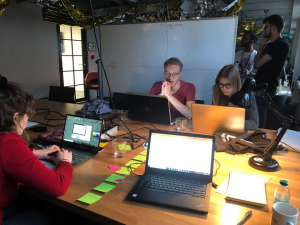 e.g. hours spent watching Netflix, amount of money spent on clothing, etc. in correlation with the weather, your mood, etc.
e.g. hours spent watching Netflix, amount of money spent on clothing, etc. in correlation with the weather, your mood, etc.
Since time was very limited (you only get 24 hours to „hack your project into reality“), the two developers of our team started plotting the data we picked out from a Kaggle data set (provided by someone from Canada who tracked his sleep over about four years), while Heike and I focused on the design and preparing mockups for a potential dashboard.
While our team decided to go home to get some rest during the night, there were several participants who actually „hacked through the night“ and used sleeping bags / sleeping opportunities provided by the organizers.
On the next morning, the final countdown began. There was only about three hours left to finish the project and to prepare a presentation to hold in front of the judges and the other participants – later in the day, we got the chance to walk around the work spaces to have a look at all of the projects in the form of an expo.

preparing our presentation to be held in front of the judges
It was actually amazing to see all the projects developed in such a small amount of time. It was interesting to see the broad range of topics the groups worked on – from apps concerning the environment and mental health to apps helping you find the perfect delivery service according to which food you would like to order.
The organizers really made an effort to make everyone feel welcome and create a work-friendly and productive atmosphere. Whenever questions popped up, be it organizatory or technically, there were prompt many helping hands or at least someone who would try and get a mentor or another participant to help.
The event itself was held completely in English, which made it easier for all the non-Germans (there were actually people from 22 nations) to communicate with each other. Like I previously mentioned, it was pretty weird in the beginning talking to someone, who you know is German, in English, but I got used to it pretty quick.
I actually met lots of interesting people, be it my fellow team members for the Hackathon, two girls that study in my hometown Münster, as well as founders from Portugal, students from Sweden, etc.
Even though me and my team did not win any prizes or got to be among the first three places, I had lots of fun during the event, met many amazing people, learned new things and personally just thought this event was a very fitting start into my second semester here at uni.
To be honest, I do not know quite yet if I will be another hackathon in the future, but I definitely recommend it to anyone who is interested. One of the great things about Slash is that people from many different „backgrounds“ attended the event, meaning the participants were not „techies“ only – people who study business, design, computer science, psychology, medicine, etc. were all allowed and welcome to apply.
If you would like to know more about Slash, you can visit their website. If you have any questions, feel free to reach out to me.
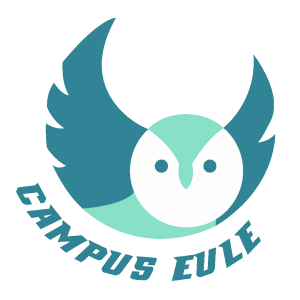
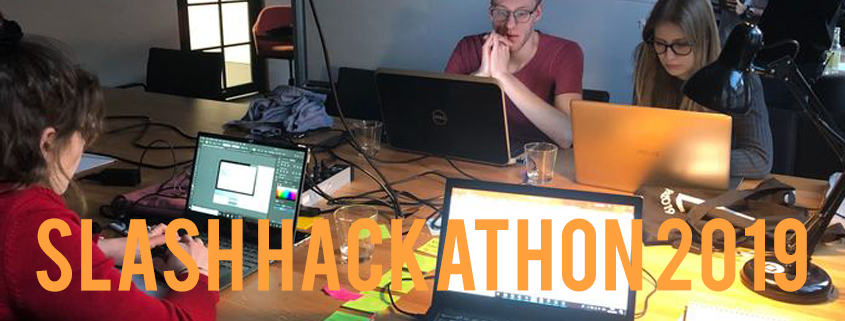
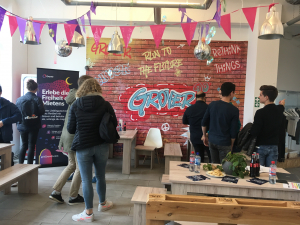




 After getting some lunch with the group, we made our way back to campus right in time for an opening talk, followed by workshops on Bitcoin, Smart Contracts and Ethereum. During breaks we were offered Mate, Coffee, tea and snacks (all for free!).
After getting some lunch with the group, we made our way back to campus right in time for an opening talk, followed by workshops on Bitcoin, Smart Contracts and Ethereum. During breaks we were offered Mate, Coffee, tea and snacks (all for free!).


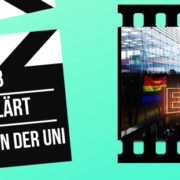


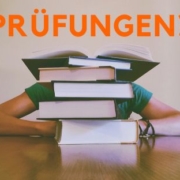

Hinterlasse einen Kommentar
An der Diskussion beteiligenHinterlasse uns deinen Kommentar!